SIMPLIFYING SQUARE ROOTS AND CUBE ROOTS WORKSHEET
Subscribe to our ▶️ YouTube channel 🔴 for the latest videos, updates, and tips.
(1) √289
(2) √441
(3) √625
(4) √1024
(5) √0
(6) √1369
(7) √6889
(8) √10000
(9) 3√1
(10) 3√64
(11) 3√125
(12) 3√343
(13) 4√0
(14) 4√16
(15) 3√-1
(16) 3√-27
(17) 4√625
(18) 5√1
(19) 5√-1
(20) 5√-32
21) Is 176 a perfect square? If not, find the smallest number by which it should be multiplied to get a perfect square.
22) Is 9720 a perfect cube? If not, find the smallest number by which it should be divided to get a perfect cube.

Find :
Problem 1 :
√289
Solution :
Given, √289
We use prime factorization to find square roots.
we get,
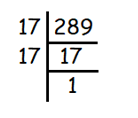
√289 = √(17 × 17)
For every two same values, we can take one out of them.
= 17
So, the answer is 17
Problem 2 :
√441
Solution :
Given, √441
We use prime factorization to find square roots.
We get,
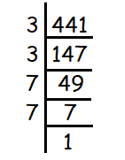
√441 = √(3 × 3 × 7 × 7)
For every two same values, we can take one out of them.
= 3 × 7
= 21
So, the answer is 21
Problem 3 :
√625
Solution :
Given, √625
We use prime factorization to find square roots.
We get,
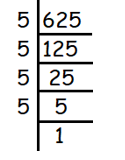
√625 = √(5 × 5 × 5 × 5)
For every two same values, we can take one out of them.
= 5 × 5
= 25
So, the answer is 25
Problem 4 :
√1024
Solution :
Given, √1024
We use prime factorization to find square roots.
We get,
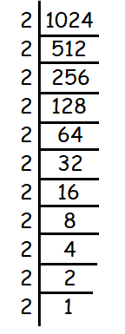
√1024 = √(2 × 2 × 2 × 2 × 2 × 2 × 2 × 2 × 2 × 2 × 2)
For every two same values, we can take one out of them.
= 2 × 2 × 2 × 2 × 2
= 32
So, the answer is 32
Problem 5 :
√0
Solution :
Given, √0
√0 = √0 x 0
Since, square root of zero is zero
So, the answer is 0.
Problem 6 :
√1369
Solution :
Given, √1369
We use prime factorization to find square roots.
We get,
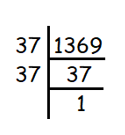
So, the answer is 37
Problem 7 :
√6889
Solution :
Given, √6889
We use prime factorization to find square roots.
We get,
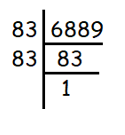
√6889 = √(83 × 83)
= 83
So, the answer is 83
Problem 8 :
√10000
Solution :
Given, √6889
We use prime factorization to find square roots.
We get,
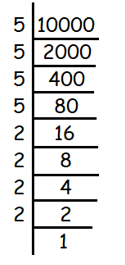
√10000 = √(5 × 5 × 5 × 5 × 2 × 2 × 2 × 2)
= 5 × 5 × 2 × 2
= 100
So, the answer is 100.
Problem 9 :
3√1
Solution :
Given, 3√1
3√1 = 3√(1 x 1 x 1) ==> 1
So, the answer is 1
Problem 10 :
3√64
Solution :
Given, 3√64
We use prime factorization to find cube roots.
We get,
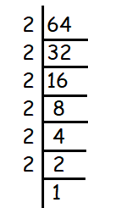
= 3√(2 × 2 × 2 × 2 × 2 × 2)
= 2 × 2
= 4
So, the answer is 4
Problem 11 :
3√125
Solution :
Given, 3√125
We use prime factorization to find cube roots.
We get,
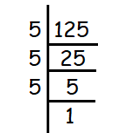
= 3√(5 × 5 × 5)
For every three same values, we can take one out of them.
= 5
So, the answer is 5
Problem 12 :
3√343
Solution :
Given, 3√343
We use prime factorization to find cube roots.
We get,
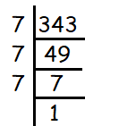
= 3√(7 × 7 × 7)
= 7
So, the answer is 7
Problem 13 :
4√0
Solution :
Given, 4√0
Since fourth root of 0 is 0
So, the answer is 0
Problem 14 :
4√16
Solution :
Given, 4√16
We use prime factorization to find fourth roots.
We get,
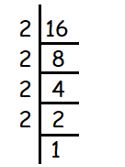
= 4√(2 × 2 × 2 × 2)
For every four same values, we can take one out of them.
= 2
So, the answer is 2
Problem 15 :
3√-1
Solution :
Given, 3√-1
Since cube root of - 1 is - 1
So, the answer is – 1
Problem 16 :
3√-27
Solution :
Given, 3√-27
We use prime factorization to find cube roots.
We get,
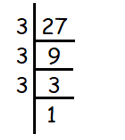
= 3√(-3) × (-3) × (-3)
= -3
So, the answer is - 3
Problem 17 :
4√625
Solution :
Given, 4√625
We use prime factorization to find fourth roots.
We get,
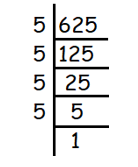
= 4√(5 × 5 × 5 × 5)
= 5
So, the answer is 5
Problem 18 :
5√1
Solution :
Given, 5√1
Since fifth root of 1 is 1
So, the answer is 1
Problem 19 :
5√-1
Solution :
Given, 5√-1
5√-1 = 5√(-1) x (-1) x (-1) x (-1) x (-1)
So, the answer is – 1
Problem 20 :
5√-32
Solution :
Given, 5√-32
We use prime factorization to find fifth roots.
We get,
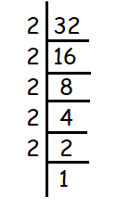
= 5√(-2) × (-2) × (-2) × (-2) × (-2)
= -2
So, the answer is -2
Problem 21 :
Is 176 a perfect square? If not, find the smallest number by which it should be multiplied to get a perfect square.
Solution :
√176
To check if 176 is a perfect square or not, we have to decompose 176 as prime factors.
√176 = √(2 x 2 x 2 x 11)
Here we see two 2's, in order to make it as pairs, we need one more 2 and one more 11.
= √(2x 2 x 2 x 2 x 11 x 11)
= (2 x 2 x 11)2
22 is smallest number to be multiplied to make 176 as perfect square.
Problem 22 :
Is 9720 a perfect cube? If not, find the smallest number by which it should be divided to get a perfect cube.
Solution :
To check if 9720 is a perfect cube or not, we have to decompose 9720 as prime factors.
3√9720 = 3√(2 x 2 x 2 x 3 x 3 x 3 x 3 x 3 x 5)
= 3√(23 x 35 x 5)
= 2 x 3 3√(32 x 5)
To make it as perfect cube, we need to have one 3 and two 5's.
So, 45 is the least number to be multiplied to make 9720 as perfect cube.
Subscribe to our ▶️ YouTube channel 🔴 for the latest videos, updates, and tips.
Kindly mail your feedback to v4formath@gmail.com
We always appreciate your feedback.
About Us | Contact Us | Privacy Policy
©All rights reserved. onlinemath4all.com

Recent Articles
-
US Common Core K-12 Curricum Algebra Solving Simple Equations
Jan 07, 26 01:53 PM
US Common Core K-12 Curricum Algebra Solving Simple Equations -
10 Hard SAT Math Questions (Part - 4)
Jan 05, 26 06:56 PM
10 Hard SAT Math Questions (Part - 4) -
10 Hard SAT Math Questions (Part - 3)
Jan 05, 26 06:34 PM
10 Hard SAT Math Questions (Part - 3)

